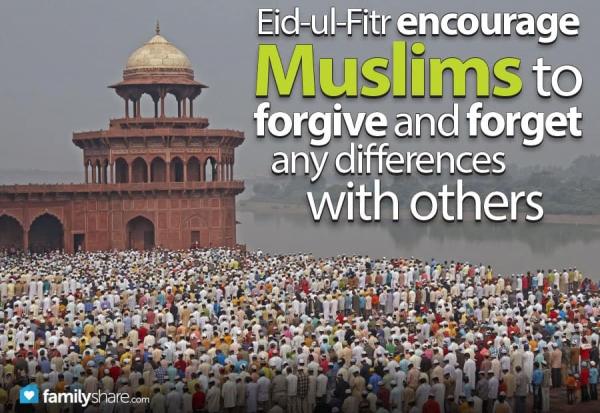
Millions of Muslims around the globe end their month-long fast of Ramadan with the celebration of Eid al-Fitr, which is the Lesser Eid (the other being Eid al-Adha or the Greater Eid). While all Muslims partake of the festivities, it is done a little differently depending on what part of the world you live in.
Ramadan, the ninth month of the Islamic calendar, is the Islamic holy month of fasting, wherein the Muslims fast from dawn to sunset for 29 to 30 days. When Ramadan ends, Eid al-Fitr, also known as the Feast of Breaking the Fast, the Sugar Feast or the Sweet Festival, begins and lasts anywhere from one to four days, depending on where you live. The celebration begins on the first day of the month of Shawwal. The religious Eid, or festival, is a single day when Muslims are not permitted to fast. It is followed by three or four days of festivities.
One of the interesting things to understand about Eid al-Fitr is that the holiday is always at the same time on the Islam calendar, which is lunar. The calendar that most westerners follow is the Gregorian calendar, or solar calendar. This means that Eid al-Fitr would fall approximately 11 days earlier each successive year. So by the Gregorian calendar, it could fall any time of the year.
A lovely part of this celebration is that all Muslims are encouraged on this day to forgive and forget any differences with others or animosities that may have occurred during the year.
This ritualistic holy holiday transpires like this:
-
Awake, always before sunrise;
-
Offer Salatul Fajr, which is the pre-sunrise prayer;
-
In the tradition of the Prophet Muhammad, we present our best selves by brushing our teeth, taking a shower, putting on new clothes or the best that we have, and applying perfume;
-
Since fasting is forbidden, we partake of a breakfast that is usually small and sweet, such as dates;
-
Offer Zakat, which is donating money to the poor and needy as an obligatory act of charity prior to the Eid prayer;
-
Then it is time to attend a special Eid prayer, known as salat. This takes place in a mosque, a large open field or community center.
The salat, or Islamic prayer, consists of two units, called rakats. It is performed in a congregation,or Jama'at and has an addition extra six Takbirs. A Takbir is the raising of the hands to the ears while saying "Allahu Akbar,"� or "God is Great."�
Participation in Eid means
-
To show happiness;
-
To give as much charity as is possible;
-
To pray Fajr in the local Masjid;
-
To go early for Eid salaat;
-
To read the takbirat in an open field;
-
Go to the Eid prayer on foot;
-
Do not speak one word other than words that remember Allah or anything Islamic terms before and after Eid Salaat; we can speak once we've left the Masjid, or Mosque or any other place we were praying;
-
Say "Eid Mubarak" ("Blessed Festival") to other Muslims;
Muslims recite the following incantation in a low voice while going to the Eid prayer: "Allāhu Akbar, Allāhu Akbar, Allāhu Akbar. Lā ilāha illà l-Lāh wal-Lāhu akbar, Allahu akbar walil-Lāhi l-ḥamd;" recitation ceases when they get to the place of Eid (festival) or once the Imam (worship leader of a mosque) commences activities;
It is recommended that Muslims use separate routes to and from the prayer grounds.
The Eid prayer is performed in congregation in open areas like fields, community centers, or at mosques. No call to prayer is given for this Eid prayer, and it consists of only two units of prayer, with an additional six incantations. The Eid prayer is followed by the sermon and then a supplication asking for God's forgiveness, mercy, peace and blessings for all living beings across the world. The sermon also instructs Muslims as to the performance of rituals of Eid, such as the zakat (charitable donations). Listening to the sermon at Eid is a requirement and while the sermon is being delivered, it is forbidden to talk, walk about or offer prayer. After the prayers, Muslims visit their relatives, friends and acquaintances or hold large communal celebrations in homes, community centers or rented halls.
Eid gifts, known as Eidi, are frequently given at Eid to children and immediate relatives.
Celebrations differ slightly throughout the world, from Australia to Canada and China to Africa.
The United States Postal Service has issued several stamps throughout the years commemorating Eid, beginning in 2001, with stamps honoring both Eid al-Fitr and Eid al-Adha.

